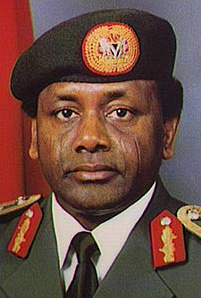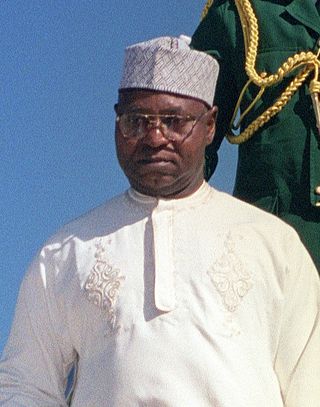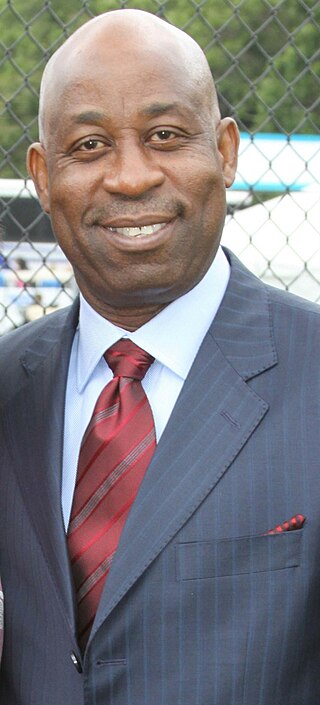Related Research Articles

Sani Abacha ; was a Nigerian Army General and politician who ruled as the military head of state after seizing power in 1993 until his death in 1998. Abacha's seizure of power was the last successful coup d'état in Nigerian military history.

Chief Ernest Adegunle Oladeinde Shonekan was a Nigerian lawyer and statesman who served as the interim head of state of Nigeria from 26 August 1993 to 17 November 1993. He was titled Abese of Egbaland from 1981.

Chief Moshood Kashimawo Olawale Abiola, also known as M. K. O. Abiola was a Nigerian businessman, publisher, and politician. He was the honorary supreme military commander of the Oyo Empire and an aristocrat of the Egba clan.

The National Party of Nigeria (NPN) was the dominant political party in Nigeria during the Second Republic (1979–1983).

Babagana Kingibe OV GCON is a Nigerian diplomat, politician and civil servant who has held several high ranking government offices, culminating in his appointment as the Secretary to the Government of the Federation from 2007 to 2008. He spent over a decade in the Foreign Service cadre and has been in politics since the 1970s serving six heads of state; most recently as a member of the inner circle of President Muhammadu Buhari.

The Punch is a Nigerian daily newspaper founded on August 8, 1970. Punch Nigeria Limited is registered under the Companies Act of 1968 to publish newspapers, magazines and other periodicals. The newspaper's aim is said to be to inform, educate and entertain Nigerians and the world at large.

The Third Republic was the planned republican government of Nigeria in 1992 which was to be governed by the Third Republican constitution. In the Third Republic, there were democratically elected state governors and state assemblies and a democratically elected federal legislature. The republic was however not fully democratic as there was no democratically elected civilian president. The then military president Ibrahim Babangida's supposed transition eventually turned out to be a ploy to keep executive powers and grant the National Assembly limited legislative powers. Hence all laws passed by the Senate and House of Representatives will have to pass the National Defence and Security Council of Nigeria and finally approved by the President. So while Babangida changed the usual style adopted by preceding military leaders from Head of State to President, he will continue to postpone presidential elections and eventually annul the ultimate one held on 12 June 1993. The Third Republic can thus be described as half military and half civilian.

Abdulsalami Abubakar is a Nigerian statesman and retired Nigerian army general who served as the military head of state of Nigeria from 1998 to 1999. He was also Chief of Defence Staff from 1997 to 1998. He succeeded General Sani Abacha upon the latter's death.
The National Democratic Coalition (NADECO) was formed on 15 May 1994 by a broad coalition of Nigerian democrats, who called on the military government of Sani Abacha to step down in favor of the winner of the 12 June 1993 election, M. K. O. Abiola. The members mostly came from several pro-democracy and activist groups located especially in Lagos, the southwest region of the country. They quickly became the symbol of mass resistance against military rule. On 11 June 1994, using the groundwork laid by NADECO, Abiola declared himself president and went into hiding. He reemerged and was promptly arrested on 23 June.
Abdulkareem Adisa was a Nigerian major general who was military governor of Oyo State during the military regime of General Ibrahim Babangida. He was convicted for involvement in an attempted coup against military head of state General Sani Abacha in 1997, and was on death row when Abacha died in June 1998. He was subsequently pardoned.
Lamidi Ona-Olapo Adesina ; 20 January 1939 – 11 November 2012) was a Nigerian educator and politician who became governor of Oyo State in Nigeria on 29 May 1999 after winning the 1999 Oyo State gubernatorial election as a member of the Alliance for Democracy (AD) party.

Chief Dele Momodu is a Nigerian journalist/publisher, businessman, and motivational speaker. He is the CEO and publisher of Ovation International, a magazine that has given publicity to people from all over the world, mainly in Africa. In 2015, he officially launched Ovation TV and subsequently launched an online newspaper called The Boss Newspapers. Momodu has received hundreds of awards and honors for his work in the world of business, politics, literature, the music industry and the fashion industry. He writes a weekly column called "Pendulum", published every Saturday on the back page of Thisday newspaper. The articles are praised for highlighting issues in Nigeria, as well as discussing popular topics, current events and notable people, often in a polemic/critical style. ,

Presidential elections were held in Nigeria on 12 June 1993, the first since the 1983 military coup ended the country's Second Republic. The elections was the outcome of a transitional process to civilian rule spearheaded by the military ruler, Ibrahim Badamasi Babangida. The unofficial result of the election – though not declared by the National Electoral Commission (NEC) – indicated a victory for Moshood Kashimawo Olawale Abiola of the Social Democratic Party (SDP), who defeated Bashir Tofa of the National Republican Convention (NRC). The winner of the election was thus never declared as the elections were annulled by Babangida, citing electoral irregularities. The annulment led to protests and political unrest, including the resignation of IBB and a weak interim civilian government, and culminated in the continuation of military rule in the country with Sani Abacha ascending to power as the military head of state via a bloodless coup later in the year.

P.M. News is a daily newspaper published in Lagos, Nigeria, by the Independent Communications Network Limited (ICNL). The company also publishes the weekly TheNEWS magazine and Tempo, a tabloid.

Hamza Al-Mustapha is a retired Nigerian Army major, intelligence officer and politician who served as Chief Security Officer to Head of State General Sani Abacha from 1993 until his death on 8 June 1998.
Alex Ibru was a Nigerian businessman, founder and publisher of The Guardian (Nigeria) newspaper, who was minister of internal affairs from 1993 to 1995 during the military regime of General Sani Abacha.

Henry Dele Alake ; born 6 October 1956) is a Nigerian journalist, activist and technocrat who is the current Nigerian minister of Solid Minerals. He is a former commissioner for Information and Strategy of Lagos State serving from 1999 to 2007.
Olusegun Adeniyi is a Nigerian journalist, current chair of the editorial board of ThisDay newspapers and a former presidential spokesman to the late President Umaru Musa Yar'Adua.

The Interim National Government was the government of Nigeria following the crisis of the Third Republic after General Ibrahim Babangida handed power over to Ernest Shonekan as interim Head of State on 27 August 1993. The largely powerless government was dissolved when General Sani Abacha seized power on 17 November 1993.
Kayode Soyinka is a Nigerian journalist, publisher, and author.
References
- ↑ "Aviation Archives". The Concord Group. Retrieved 23 September 2021.
- ↑ Refugees, United Nations High Commissioner for. "Refworld | Nigeria: Information on whether the National Concord newspaper was banned in 1994; and if so, on the periods when it was banned and on whether its offices and premises were closed and sealed by the government throughout July 1994". Refworld. Retrieved 23 September 2021.
- ↑ Capital, Concord Summit. "Concord Summit Capital Announces The Expansion Of Its Operations To Denver". www.prnewswire.com (Press release). Retrieved 23 September 2021.
- ↑ "Land dispute: Hoodlums attack occupants of Abiola Farms, Ayobo". Vanguard News. 6 April 2019. Retrieved 23 September 2021.
- 1 2 Uche, Luke (1989). Mass media, people, and politics in Nigeria. Concept Pub. Co. pp. 107–110. ISBN 9788170222323.
- ↑ "National concord". Library of Congress. Retrieved 23 September 2021.
- 1 2 Obi, Lewis (July 19, 1984). "Concord Story". Concord Weekly.
- 1 2 Forrest, Tom (1994). The advance of African capital : the growth of Nigerian private enterprise. University Press of Virginia. pp. 99–102. ISBN 9780813915623.
- ↑ Media Rights Bulletin (1995), "Shutting down the press: the practice of newspaper closure and proscription in Nigeria". Media Rights Bulletin 1(1): 1–15.
- ↑ "Concord Airlines". rzjets. Retrieved 4 April 2022.
- ↑ Anaeto, Emeka (12 June 2018). "Nigeria: How June 12 Ruined Abiola, Others' Businesses". Vanguard (Lagos).
- 1 2 Okereocha, Chikodi (30 August 2015). "Receding fortunes of family business empires". The Nation Nigeria.
- ↑ Christina Lamb, "Editors Defy Nigerian Reign of Fear", Sunday Times (London), 24 December 1995